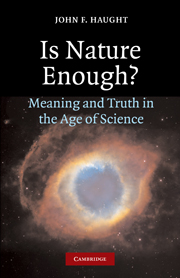11 - Death
Published online by Cambridge University Press: 05 June 2012
Summary
And all that borrows life from Thee
Is ever in thy care,
And everywhere that man can be
Thou, God, art present there.
Isaac Watts, 1715However fragile life may be
'Tis in the system's care,
And everywhere that man can be
The Universe is there.
Kenneth E. Boulding, 1975According to much modern thought, the natural and most intelligible state of the universe is one in which life and mind do not yet exist. Life and mind are puzzling exceptions to the fundamental lifelessness of the cosmos. However, people did not always look at things this way. To most of our ancestors, as Hans Jonas points out, life was the fundamental reality, death the unintelligible exception. Naturalistic belief, however, has supplanted the earlier panvitalist view of reality in which everything throbbed with life. The naturalistic agenda is now that of explaining how life, and eventually mind, emerged from the earlier and simpler lifelessness of the cosmos. Both Jonas and Paul Tillich have even referred to modern scientific naturalism as favoring what may be called an “ontology of death.” What they mean by this designation is that over the course of time the universe has literally died in our hearts and minds. This is a severe assessment, but there is no denying that scientific materialism typically assumes that the fundamental being of the cosmos is lifeless.
- Type
- Chapter
- Information
- Is Nature Enough?Meaning and Truth in the Age of Science, pp. 191 - 208Publisher: Cambridge University PressPrint publication year: 2006



